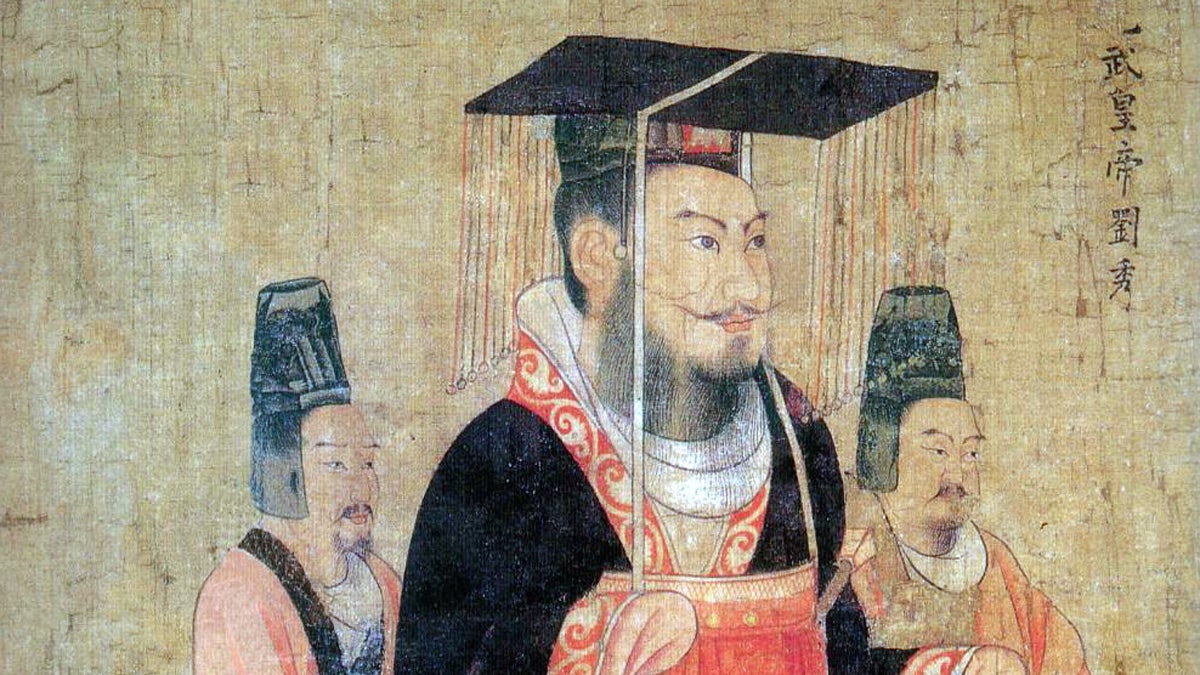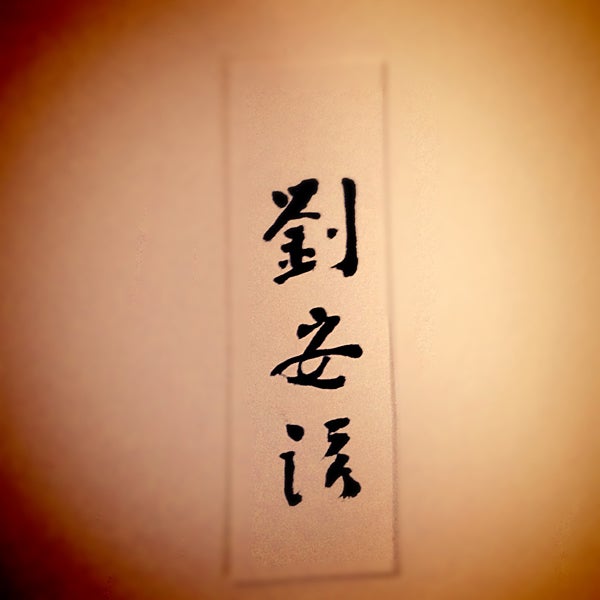Defending my respectable, simple, impossible name

Emperor Guangwu, born Liu Xiu, was an emperor of the Han Dynasty during the first century. He unified disparate parts of China during his rule. (Wikipedia Commons)
In terms of name recognition, Liu is almost unequaled. It identifies millions of souls, none of whom ever needs to clarify his name upon introduction. In China, that is. Here, it’s a different story.
Don’t laugh, but sometimes I feel sorry for my name. Yes, my last name. A perfectly respectable name, belonging to the emperors of the Han Dynasty, who ruled China from 296 B.C. to 220 A.D., it goes back 3,000 years in history.
Being respectable is only one of its virtues. In terms of name recognition, Liu (劉) is almost unequaled. The seventh most popular of Chinese family names, it identifies millions of souls, none of whom ever needs to clarify his name upon introduction.
In China, that is.
Here, it’s a different story.
 ‘Annabel Liu’ is rendered in free-form brush strokes. The first word, (劉), the one with the most strokes, is the last name, Liu, and the next two (安諾), are her given name. (Liu Family)
‘Annabel Liu’ is rendered in free-form brush strokes. The first word, (劉), the one with the most strokes, is the last name, Liu, and the next two (安諾), are her given name. (Liu Family)
From ‘Huh?’ to ‘Are you joking?’
I can still remember one graduate course during my first year in this country, where the professor insisted upon taking roll call. Every Tuesday and Thursday for 10 weeks, he didn’t get my name right once.
First it was Lin, then Lee, then Lie and Low. I wanted to lie low, to not engage in a tug of war over my name each time he stepped onto the podium. Finally he gave up and just called me Mabel.
Too dense to take heed that this experience presaged further trouble, I compounded my problem by marrying someone with the same last name. Instantly, I became Annabel Liu-Liu (many in this country would pronounce it Lu-Lu), whereas my husband acquired the privilege of announcing in social gatherings years later, “I’m the true-blue feminist — both of my kids go by my wife’s family name!”
Meanwhile, misspellings of our name went on unabated. Over decades, in lieu of Liu, we have been called Liv, Sin, Lou, Lei, Leo, Lio, Leu, Lye, Li, Lo, Lu, Lue, Liou, Loue, Loey, Lowe, and inevitably, Lui and Lieu.
Mail reached our house with such a profusion of bizarre spellings that we yearned to receive letters simply addressed to “Resident.”
Just when we thought the well-meaning perpetrators of these errors had exhausted all possibilities, at property tax time we found our house was registered in the name of Loo, the British colloquialism for bathroom or toilet.
Once someone entered your name incorrectly into their database, it was difficult to convince them to fix it. We tried for years, but it was impossible to persuade them that our name was not Lew or Lice. Speaking of computers, to this day, if you type my name into the Amazon search bar, sometimes it will auto-correct to Lui.
For sheer imagination, the prize goes to two individuals who were particularly creative with my name. I was more than a little disconcerted one day when a caller requested to speak with “Animal Lie.” Another time, at a doctor’s office, the nurse led me to the scale with, “This way, Mrs. Lychee.” (Lychee, of course, is a fruit grown in Southern China, a delicacy much favored by a much-favored concubine of one of the emperors of the Tang Dynasty.)
Three letters apart
Frankly, that this simple, innocent, three-letter word should prove to be so intractable to so many in this country was a shock to me. I shudder to imagine being saddled with a formidable appellation, say, Koziashvili. But Liu? It may as well be Zhigulima-Mkrtichian!
Over the years, in order to protect my good name, I took to printing it in capital letters. On the phone or one-on-one, I would spell it out without being prompted and devise little mnemonics to aid accuracy on the part of the listener. These practices became reflex, with mixed results.
At a party one time, a kind old lady approached me. “I’m Dorothy Morgan,” she volunteered.
“Nice to meet you,” I answered. “And I’m Annabel Liu, L-I-U.”
There was a pause.
Quick to sense she needed more help, I explained in my usual thoughtful way, “L-I-U. I put I before U.”
Her perplexity seemed to deepen; the smile died on her lips. I made another try: “You know, short for Long Island University.”
Without a word, the woman began to back away, never to be seen again.
After being the lone Lius in one small town for 17 years, we moved to another small town. It was a relief to discover that there were already two other families with the same name. Imagine that, I marveled to myself, for many years these two families had been paving the way for us, diminishing, day by day, the number of the uninitiated.
The situation, however, presented a new wrinkle. While both families were well established, one had an especially renowned son, a high school soccer star whose name and photo appeared on the sports page of the local paper almost every day.
Often, indeed too often, I was accosted excitedly by those acquainted with the name, “Are you Rick Liu’s mother?”
After having lived under my husband and children’s shadow for many years, living under an additional, albeit much larger, shadow certainly didn’t bother me. But I couldn’t be an impostor. “My name is Liu,” I answered patiently for the nth time, “but sadly, the wrong Liu.”
These days, despite all the ills of globalization some are fond of espousing, there is one thing I’m thankful for — I rarely have to defend my name any more. However, sometimes I feel ambivalent about the whole thing.
While putting forth my best effort at adapting to a different culture all these years, I found in many ways I still yearn to remain me. In a country where I’ve been recast to another identity and my name rendered in another language, at times I feel like an imposter and my name an alias. Why bother to defend them? In the hope some part of me will always endure?
Perhaps it’s easier just to shrug it off as Shakespeare did: What’s in a name?
WHYY is your source for fact-based, in-depth journalism and information. As a nonprofit organization, we rely on financial support from readers like you. Please give today.

